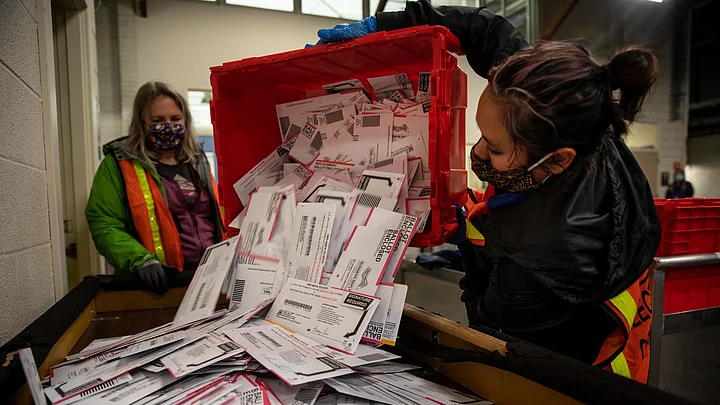As counting remains underway in the United States presidential election, days after Election Day, keeping the status of the election in what is being termed as suspended animation, one of the types of ballots set to become a big issue are provisional ballots.
WHAT ARE PROVISIONAL BALLOTS?
In the United States, if one’s name is not on the voter list at the designated polling station, a voter is given the right to use a provisional ballot to cast their vote. This type of ballot differs physically only in the sense that it is placed in a special envelope prior to being put in the ballot box.
According to CNN, under federal law, any US resident should always be able to cast a provisional ballot at the polls, even if their registration status is unclear.
These ballots are used if voters have issues that need to be resolved before their vote is counted, including a different address on the voter roll in their new precinct, forgetting to bring a mandated ID to vote, changing their name, or simply having their name misspelled on the rolls, according to NBC News.
Other issues include requesting absentee ballots and choosing to instead vote in person, having requested an absentee ballot and not receiving it, or being removed accidentally from the rolls.
In essence, absentee ballots are fallbacks when voters cannot directly and immediately prove their eligibility to vote and/or face snags in the process of voting.
WHY DO PROVISIONAL BALLOTS TAKE LONGER TO COUNT?
According to USA Today, provisional ballots are a confusing part of the voting process, and are handled differently from state to state.
According to CNN, these ballots are counted last and are initially kept separate from others while they are investigated by election officials.
According to the National Conference of State Legislatures, there are several steps involved before such a ballot is counted:
“This process entails verifying the voter’s identity and eligibility to vote, and may require the voter to provide further information. If the identity of the voter and the voter’s eligibility can be established through reviewing the voter rolls or verifying a signature, all or a portion of the ballot will be counted. If their eligibility cannot be established, the ballot will not be counted.”
In the days following Election Day, voters may need to follow up on the process and prove their identity in order for the ballot to be counted.
Naturally, all these issues take extra time to resolve, leading to a delay in the counting.
CAN THEY IMPACT THE OUTCOME OF AN ELECTION?
According to a report by NBC, absentee ballots have rarely changed the outcome of an election.
Previously, provisional ballots have made up a tiny fraction of the vote. They accounted for only 1.8 percent of the vote in the 2016 presidential election, out of which 70 votes were considered, NBC reported.
Paul Smith, a veteran elections lawyer said that he had never heard of provisional ballots turning around an election.
However, with a razor-thin margin of electoral votes, even one provisional ballot can flip a state and make the other candidate win. The report highlights that in 2020, there could be enough provisional ballots to affect the race in battleground states.
THE ROLE OF PROVISIONAL BALLOTS IN 2020
The 2020 Election has seen many firsts and has the highest voter turnout (in percentage terms) over 120 years. There has been a large use of mail-in ballots due to the coronavirus pandemic, which have changed the results in various key states.
Though the traditional assumption is that Democrats cast more provisional ballots, since there were more first-time and irregular voters in this election – unfamiliar with voting processes – both parties have cast provisional ballots.
However, provisional ballots may also be rejected, for reasons such as having being cast in the wrong jurisdiction or wrong precinct, the voter not being registered in the state, issues with the signature, insufficient identification and problems with the ballot envelope, CNN reports.
Meanwhile, CNN reported, a state judge in Pennsylvania has ordered the separation of provisional ballots, to set aside those voters who cast defective absentee ballots used to make sure their vote counted. It's unknown at this time how many of Pennsylvania's provisional ballots this might affect.
(At The Quint, we question everything. Play an active role in shaping our journalism by becoming a member today.)
